Business Law: Sources, Role of Government, Impact on Business
VerifiedAdded on 2023/06/10
|9
|2813
|159
AI Summary
This report explains the sources of legislation, role of government in law-making, and the impact of business law on organizations. It covers company, employment, and contract law with examples. It also evaluates the effectiveness of the legal system in terms of recent reforms and developments.
Contribute Materials
Your contribution can guide someone’s learning journey. Share your
documents today.
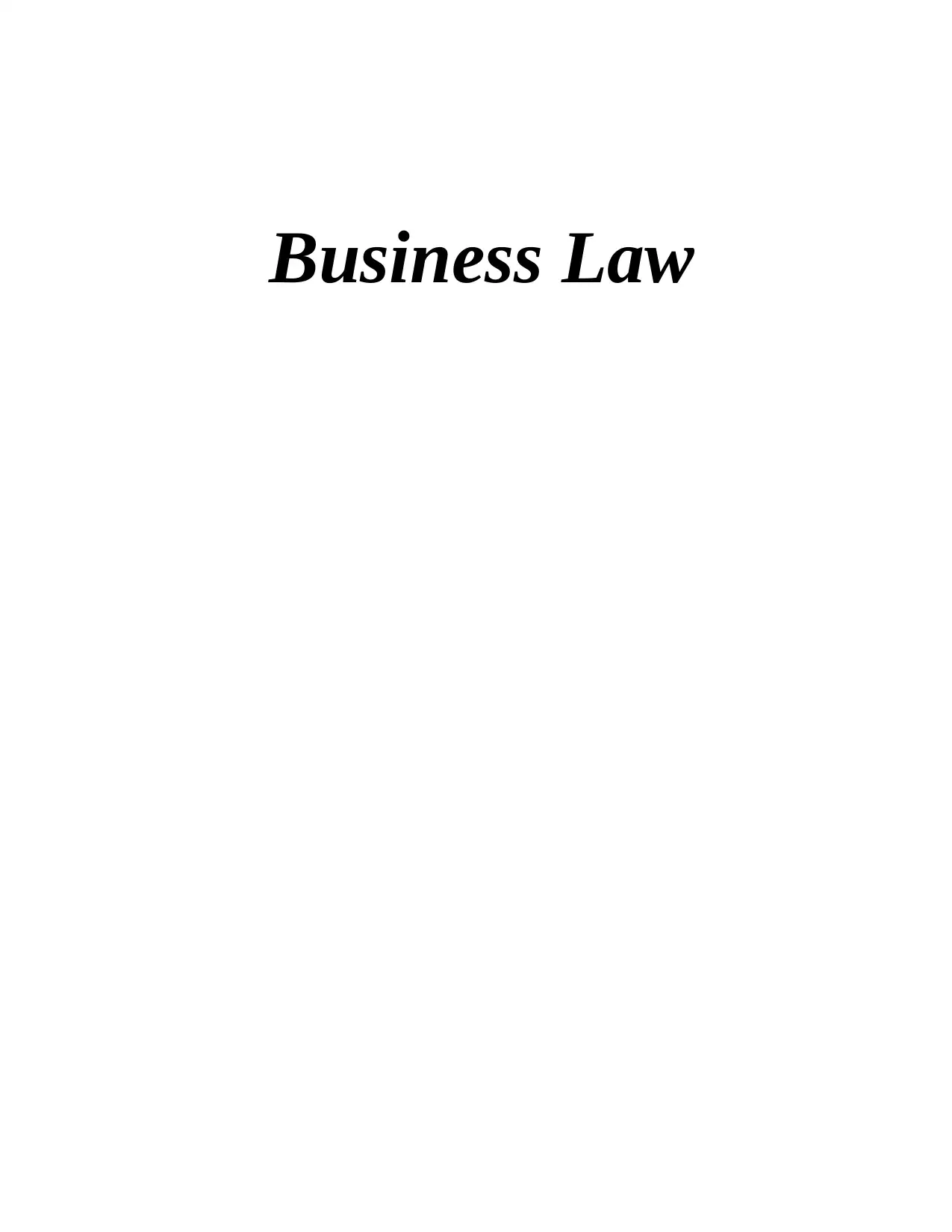
Business Law
Secure Best Marks with AI Grader
Need help grading? Try our AI Grader for instant feedback on your assignments.
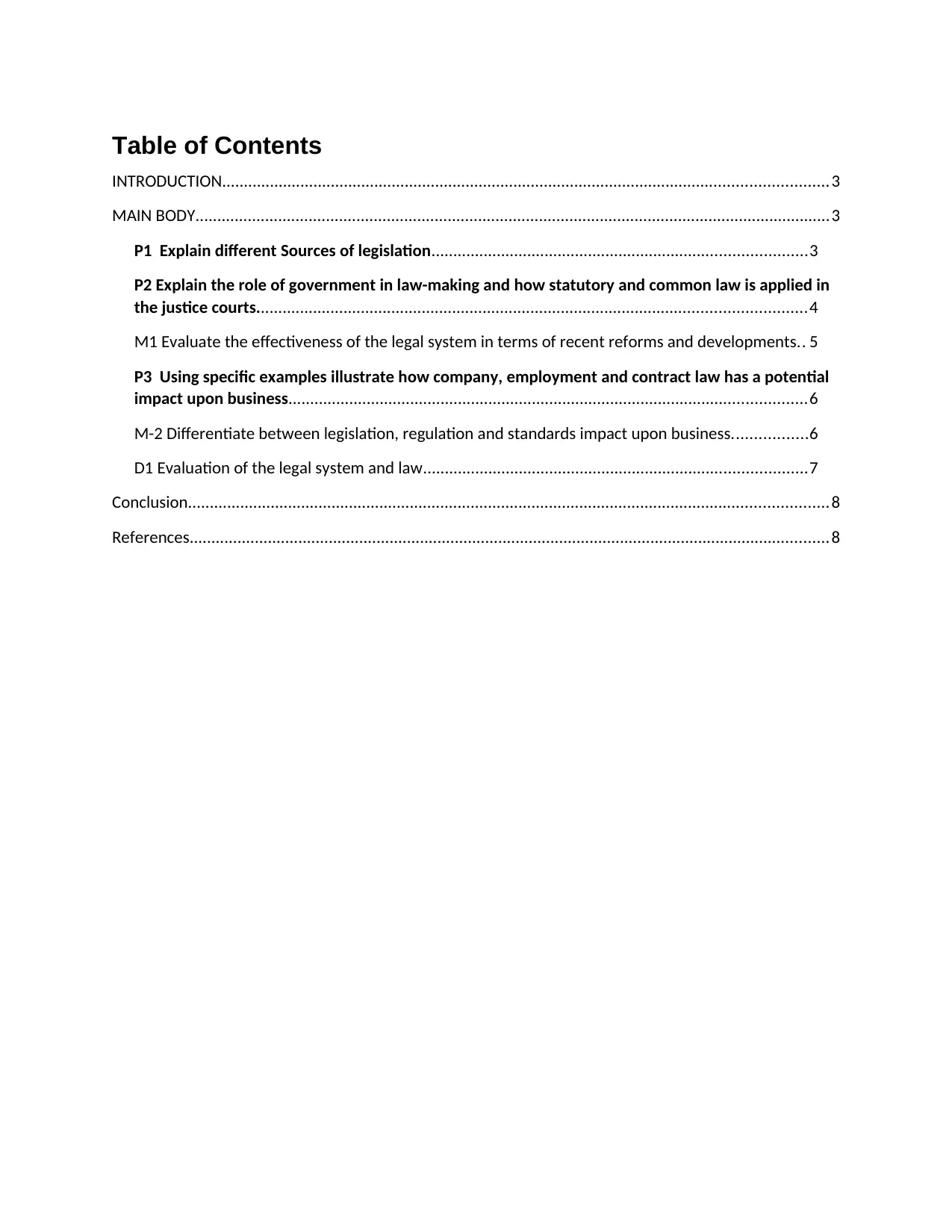
Table of Contents
INTRODUCTION...........................................................................................................................................3
MAIN BODY..................................................................................................................................................3
P1 Explain different Sources of legislation......................................................................................3
P2 Explain the role of government in law-making and how statutory and common law is applied in
the justice courts..............................................................................................................................4
M1 Evaluate the effectiveness of the legal system in terms of recent reforms and developments.. 5
P3 Using specific examples illustrate how company, employment and contract law has a potential
impact upon business.......................................................................................................................6
M-2 Differentiate between legislation, regulation and standards impact upon business.................6
D1 Evaluation of the legal system and law........................................................................................7
Conclusion...................................................................................................................................................8
References...................................................................................................................................................8
INTRODUCTION...........................................................................................................................................3
MAIN BODY..................................................................................................................................................3
P1 Explain different Sources of legislation......................................................................................3
P2 Explain the role of government in law-making and how statutory and common law is applied in
the justice courts..............................................................................................................................4
M1 Evaluate the effectiveness of the legal system in terms of recent reforms and developments.. 5
P3 Using specific examples illustrate how company, employment and contract law has a potential
impact upon business.......................................................................................................................6
M-2 Differentiate between legislation, regulation and standards impact upon business.................6
D1 Evaluation of the legal system and law........................................................................................7
Conclusion...................................................................................................................................................8
References...................................................................................................................................................8
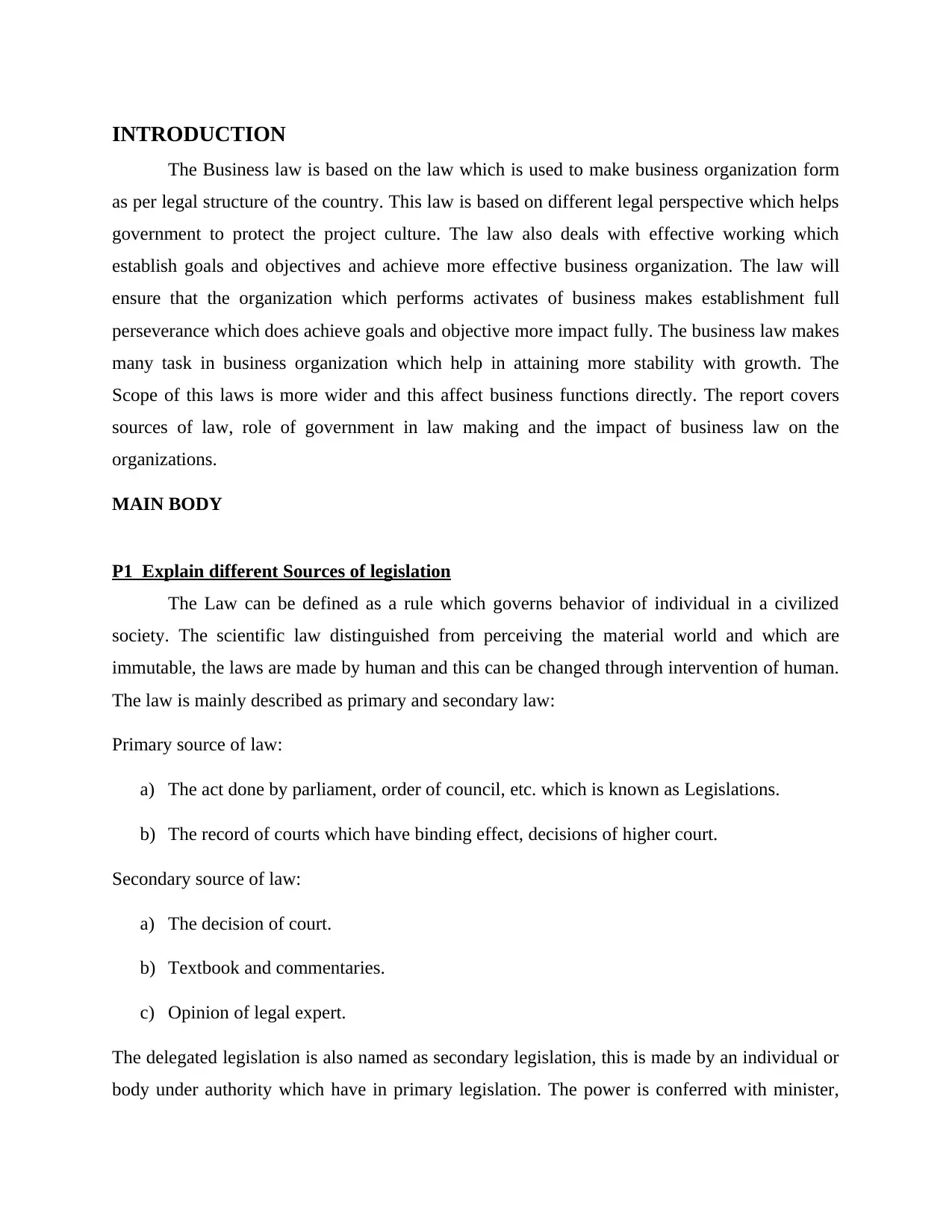
INTRODUCTION
The Business law is based on the law which is used to make business organization form
as per legal structure of the country. This law is based on different legal perspective which helps
government to protect the project culture. The law also deals with effective working which
establish goals and objectives and achieve more effective business organization. The law will
ensure that the organization which performs activates of business makes establishment full
perseverance which does achieve goals and objective more impact fully. The business law makes
many task in business organization which help in attaining more stability with growth. The
Scope of this laws is more wider and this affect business functions directly. The report covers
sources of law, role of government in law making and the impact of business law on the
organizations.
MAIN BODY
P1 Explain different Sources of legislation
The Law can be defined as a rule which governs behavior of individual in a civilized
society. The scientific law distinguished from perceiving the material world and which are
immutable, the laws are made by human and this can be changed through intervention of human.
The law is mainly described as primary and secondary law:
Primary source of law:
a) The act done by parliament, order of council, etc. which is known as Legislations.
b) The record of courts which have binding effect, decisions of higher court.
Secondary source of law:
a) The decision of court.
b) Textbook and commentaries.
c) Opinion of legal expert.
The delegated legislation is also named as secondary legislation, this is made by an individual or
body under authority which have in primary legislation. The power is conferred with minister,
The Business law is based on the law which is used to make business organization form
as per legal structure of the country. This law is based on different legal perspective which helps
government to protect the project culture. The law also deals with effective working which
establish goals and objectives and achieve more effective business organization. The law will
ensure that the organization which performs activates of business makes establishment full
perseverance which does achieve goals and objective more impact fully. The business law makes
many task in business organization which help in attaining more stability with growth. The
Scope of this laws is more wider and this affect business functions directly. The report covers
sources of law, role of government in law making and the impact of business law on the
organizations.
MAIN BODY
P1 Explain different Sources of legislation
The Law can be defined as a rule which governs behavior of individual in a civilized
society. The scientific law distinguished from perceiving the material world and which are
immutable, the laws are made by human and this can be changed through intervention of human.
The law is mainly described as primary and secondary law:
Primary source of law:
a) The act done by parliament, order of council, etc. which is known as Legislations.
b) The record of courts which have binding effect, decisions of higher court.
Secondary source of law:
a) The decision of court.
b) Textbook and commentaries.
c) Opinion of legal expert.
The delegated legislation is also named as secondary legislation, this is made by an individual or
body under authority which have in primary legislation. The power is conferred with minister,
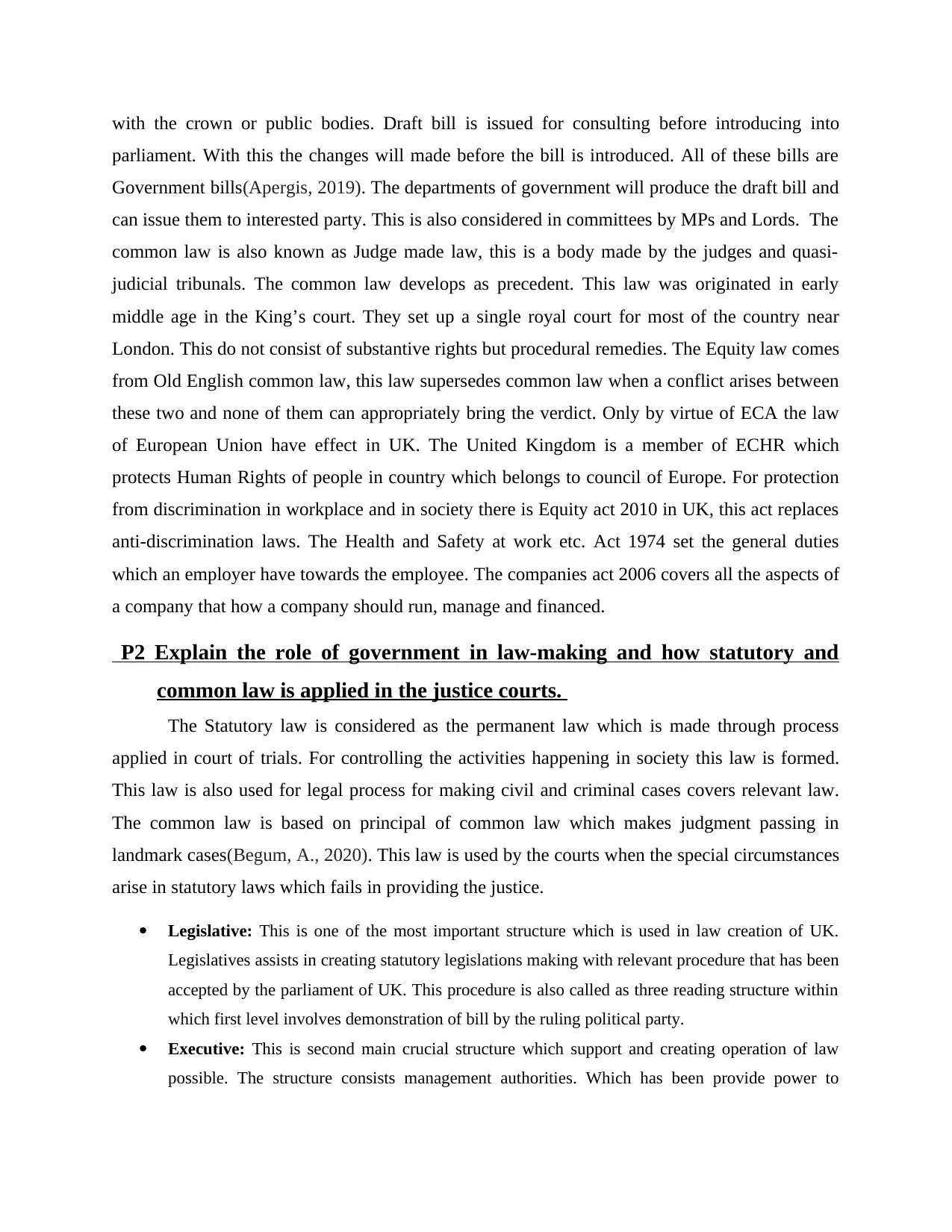
with the crown or public bodies. Draft bill is issued for consulting before introducing into
parliament. With this the changes will made before the bill is introduced. All of these bills are
Government bills(Apergis, 2019). The departments of government will produce the draft bill and
can issue them to interested party. This is also considered in committees by MPs and Lords. The
common law is also known as Judge made law, this is a body made by the judges and quasi-
judicial tribunals. The common law develops as precedent. This law was originated in early
middle age in the King’s court. They set up a single royal court for most of the country near
London. This do not consist of substantive rights but procedural remedies. The Equity law comes
from Old English common law, this law supersedes common law when a conflict arises between
these two and none of them can appropriately bring the verdict. Only by virtue of ECA the law
of European Union have effect in UK. The United Kingdom is a member of ECHR which
protects Human Rights of people in country which belongs to council of Europe. For protection
from discrimination in workplace and in society there is Equity act 2010 in UK, this act replaces
anti-discrimination laws. The Health and Safety at work etc. Act 1974 set the general duties
which an employer have towards the employee. The companies act 2006 covers all the aspects of
a company that how a company should run, manage and financed.
P2 Explain the role of government in law-making and how statutory and
common law is applied in the justice courts.
The Statutory law is considered as the permanent law which is made through process
applied in court of trials. For controlling the activities happening in society this law is formed.
This law is also used for legal process for making civil and criminal cases covers relevant law.
The common law is based on principal of common law which makes judgment passing in
landmark cases(Begum, A., 2020). This law is used by the courts when the special circumstances
arise in statutory laws which fails in providing the justice.
Legislative: This is one of the most important structure which is used in law creation of UK.
Legislatives assists in creating statutory legislations making with relevant procedure that has been
accepted by the parliament of UK. This procedure is also called as three reading structure within
which first level involves demonstration of bill by the ruling political party.
Executive: This is second main crucial structure which support and creating operation of law
possible. The structure consists management authorities. Which has been provide power to
parliament. With this the changes will made before the bill is introduced. All of these bills are
Government bills(Apergis, 2019). The departments of government will produce the draft bill and
can issue them to interested party. This is also considered in committees by MPs and Lords. The
common law is also known as Judge made law, this is a body made by the judges and quasi-
judicial tribunals. The common law develops as precedent. This law was originated in early
middle age in the King’s court. They set up a single royal court for most of the country near
London. This do not consist of substantive rights but procedural remedies. The Equity law comes
from Old English common law, this law supersedes common law when a conflict arises between
these two and none of them can appropriately bring the verdict. Only by virtue of ECA the law
of European Union have effect in UK. The United Kingdom is a member of ECHR which
protects Human Rights of people in country which belongs to council of Europe. For protection
from discrimination in workplace and in society there is Equity act 2010 in UK, this act replaces
anti-discrimination laws. The Health and Safety at work etc. Act 1974 set the general duties
which an employer have towards the employee. The companies act 2006 covers all the aspects of
a company that how a company should run, manage and financed.
P2 Explain the role of government in law-making and how statutory and
common law is applied in the justice courts.
The Statutory law is considered as the permanent law which is made through process
applied in court of trials. For controlling the activities happening in society this law is formed.
This law is also used for legal process for making civil and criminal cases covers relevant law.
The common law is based on principal of common law which makes judgment passing in
landmark cases(Begum, A., 2020). This law is used by the courts when the special circumstances
arise in statutory laws which fails in providing the justice.
Legislative: This is one of the most important structure which is used in law creation of UK.
Legislatives assists in creating statutory legislations making with relevant procedure that has been
accepted by the parliament of UK. This procedure is also called as three reading structure within
which first level involves demonstration of bill by the ruling political party.
Executive: This is second main crucial structure which support and creating operation of law
possible. The structure consists management authorities. Which has been provide power to
Secure Best Marks with AI Grader
Need help grading? Try our AI Grader for instant feedback on your assignments.
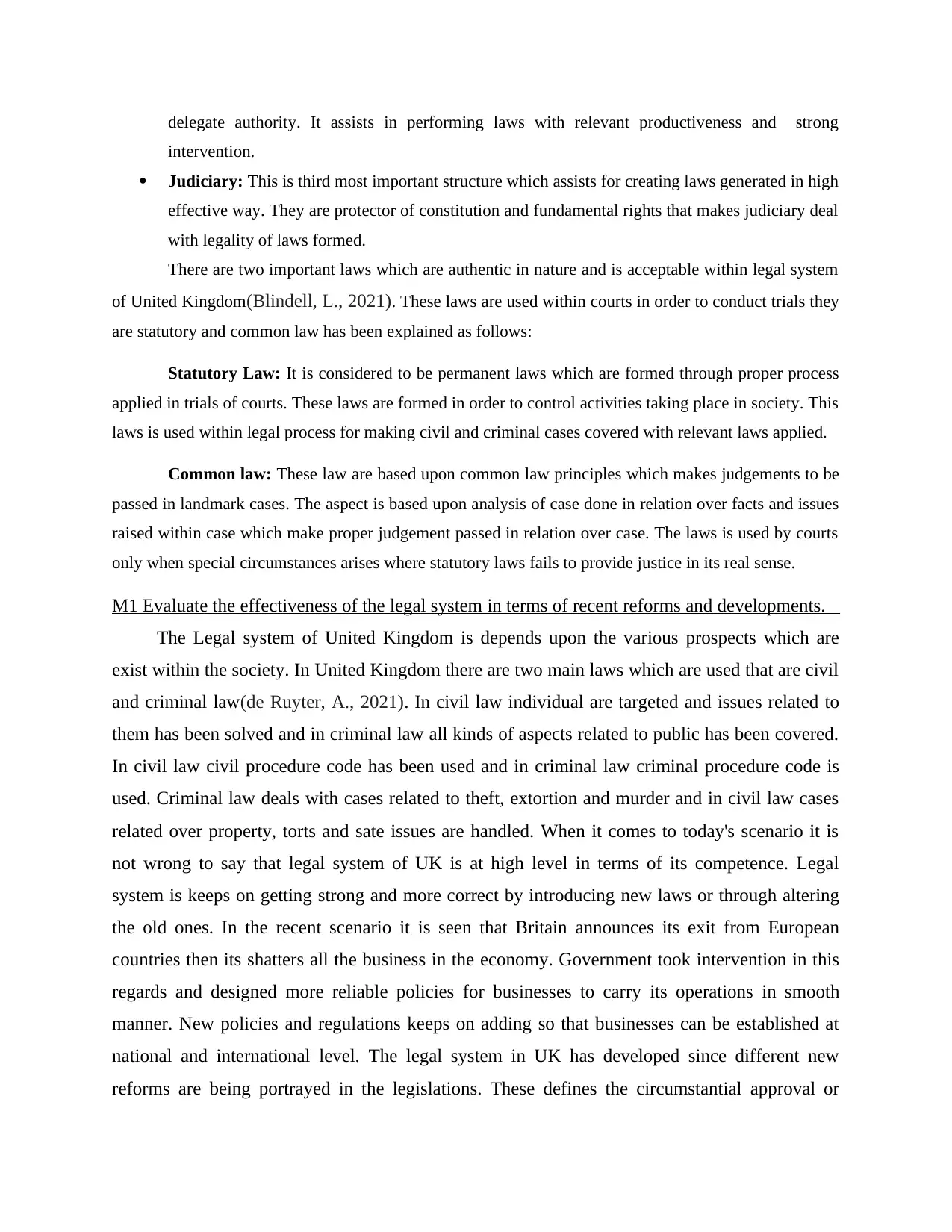
delegate authority. It assists in performing laws with relevant productiveness and strong
intervention.
Judiciary: This is third most important structure which assists for creating laws generated in high
effective way. They are protector of constitution and fundamental rights that makes judiciary deal
with legality of laws formed.
There are two important laws which are authentic in nature and is acceptable within legal system
of United Kingdom(Blindell, L., 2021). These laws are used within courts in order to conduct trials they
are statutory and common law has been explained as follows:
Statutory Law: It is considered to be permanent laws which are formed through proper process
applied in trials of courts. These laws are formed in order to control activities taking place in society. This
laws is used within legal process for making civil and criminal cases covered with relevant laws applied.
Common law: These law are based upon common law principles which makes judgements to be
passed in landmark cases. The aspect is based upon analysis of case done in relation over facts and issues
raised within case which make proper judgement passed in relation over case. The laws is used by courts
only when special circumstances arises where statutory laws fails to provide justice in its real sense.
M1 Evaluate the effectiveness of the legal system in terms of recent reforms and developments.
The Legal system of United Kingdom is depends upon the various prospects which are
exist within the society. In United Kingdom there are two main laws which are used that are civil
and criminal law(de Ruyter, A., 2021). In civil law individual are targeted and issues related to
them has been solved and in criminal law all kinds of aspects related to public has been covered.
In civil law civil procedure code has been used and in criminal law criminal procedure code is
used. Criminal law deals with cases related to theft, extortion and murder and in civil law cases
related over property, torts and sate issues are handled. When it comes to today's scenario it is
not wrong to say that legal system of UK is at high level in terms of its competence. Legal
system is keeps on getting strong and more correct by introducing new laws or through altering
the old ones. In the recent scenario it is seen that Britain announces its exit from European
countries then its shatters all the business in the economy. Government took intervention in this
regards and designed more reliable policies for businesses to carry its operations in smooth
manner. New policies and regulations keeps on adding so that businesses can be established at
national and international level. The legal system in UK has developed since different new
reforms are being portrayed in the legislations. These defines the circumstantial approval or
intervention.
Judiciary: This is third most important structure which assists for creating laws generated in high
effective way. They are protector of constitution and fundamental rights that makes judiciary deal
with legality of laws formed.
There are two important laws which are authentic in nature and is acceptable within legal system
of United Kingdom(Blindell, L., 2021). These laws are used within courts in order to conduct trials they
are statutory and common law has been explained as follows:
Statutory Law: It is considered to be permanent laws which are formed through proper process
applied in trials of courts. These laws are formed in order to control activities taking place in society. This
laws is used within legal process for making civil and criminal cases covered with relevant laws applied.
Common law: These law are based upon common law principles which makes judgements to be
passed in landmark cases. The aspect is based upon analysis of case done in relation over facts and issues
raised within case which make proper judgement passed in relation over case. The laws is used by courts
only when special circumstances arises where statutory laws fails to provide justice in its real sense.
M1 Evaluate the effectiveness of the legal system in terms of recent reforms and developments.
The Legal system of United Kingdom is depends upon the various prospects which are
exist within the society. In United Kingdom there are two main laws which are used that are civil
and criminal law(de Ruyter, A., 2021). In civil law individual are targeted and issues related to
them has been solved and in criminal law all kinds of aspects related to public has been covered.
In civil law civil procedure code has been used and in criminal law criminal procedure code is
used. Criminal law deals with cases related to theft, extortion and murder and in civil law cases
related over property, torts and sate issues are handled. When it comes to today's scenario it is
not wrong to say that legal system of UK is at high level in terms of its competence. Legal
system is keeps on getting strong and more correct by introducing new laws or through altering
the old ones. In the recent scenario it is seen that Britain announces its exit from European
countries then its shatters all the business in the economy. Government took intervention in this
regards and designed more reliable policies for businesses to carry its operations in smooth
manner. New policies and regulations keeps on adding so that businesses can be established at
national and international level. The legal system in UK has developed since different new
reforms are being portrayed in the legislations. These defines the circumstantial approval or
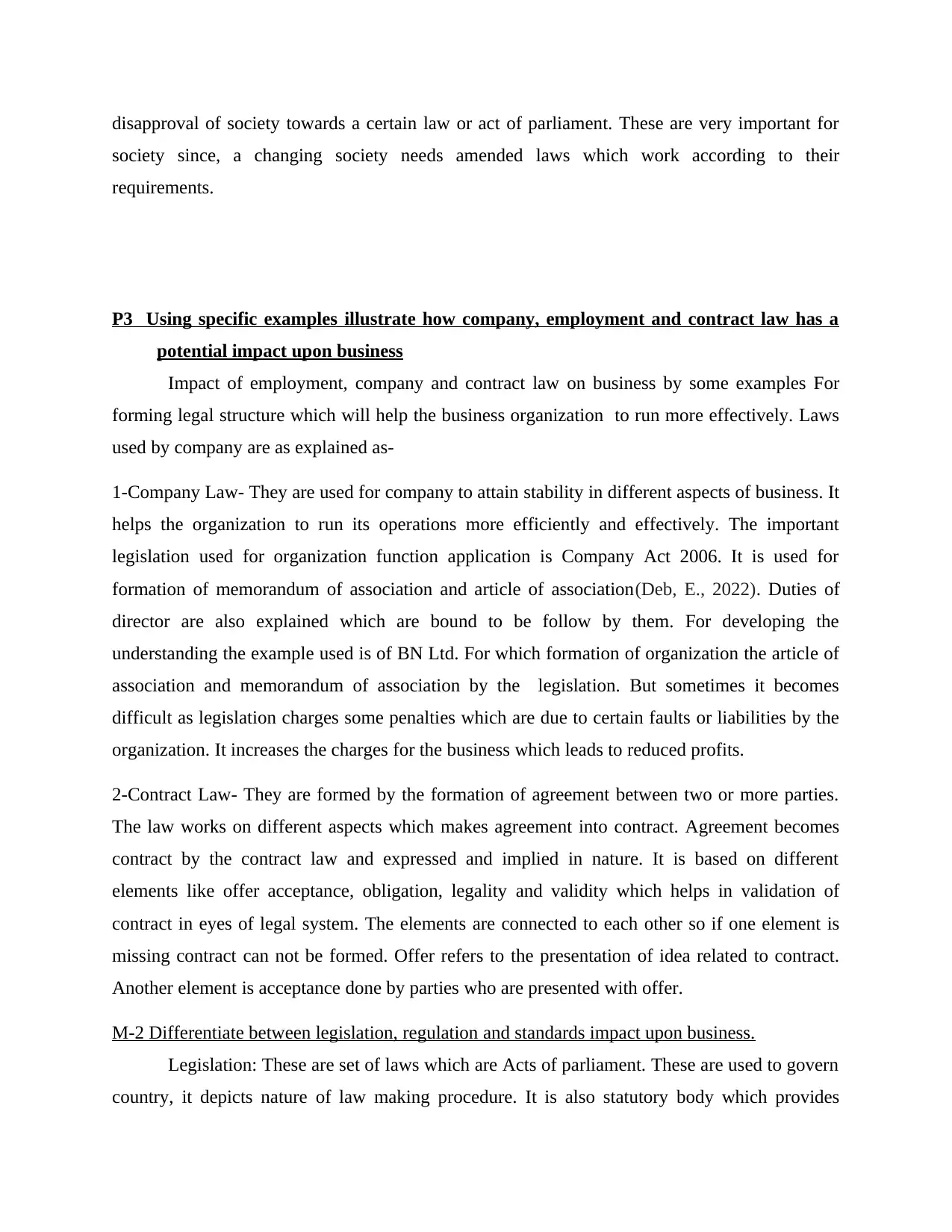
disapproval of society towards a certain law or act of parliament. These are very important for
society since, a changing society needs amended laws which work according to their
requirements.
P3 Using specific examples illustrate how company, employment and contract law has a
potential impact upon business
Impact of employment, company and contract law on business by some examples For
forming legal structure which will help the business organization to run more effectively. Laws
used by company are as explained as-
1-Company Law- They are used for company to attain stability in different aspects of business. It
helps the organization to run its operations more efficiently and effectively. The important
legislation used for organization function application is Company Act 2006. It is used for
formation of memorandum of association and article of association(Deb, E., 2022). Duties of
director are also explained which are bound to be follow by them. For developing the
understanding the example used is of BN Ltd. For which formation of organization the article of
association and memorandum of association by the legislation. But sometimes it becomes
difficult as legislation charges some penalties which are due to certain faults or liabilities by the
organization. It increases the charges for the business which leads to reduced profits.
2-Contract Law- They are formed by the formation of agreement between two or more parties.
The law works on different aspects which makes agreement into contract. Agreement becomes
contract by the contract law and expressed and implied in nature. It is based on different
elements like offer acceptance, obligation, legality and validity which helps in validation of
contract in eyes of legal system. The elements are connected to each other so if one element is
missing contract can not be formed. Offer refers to the presentation of idea related to contract.
Another element is acceptance done by parties who are presented with offer.
M-2 Differentiate between legislation, regulation and standards impact upon business.
Legislation: These are set of laws which are Acts of parliament. These are used to govern
country, it depicts nature of law making procedure. It is also statutory body which provides
society since, a changing society needs amended laws which work according to their
requirements.
P3 Using specific examples illustrate how company, employment and contract law has a
potential impact upon business
Impact of employment, company and contract law on business by some examples For
forming legal structure which will help the business organization to run more effectively. Laws
used by company are as explained as-
1-Company Law- They are used for company to attain stability in different aspects of business. It
helps the organization to run its operations more efficiently and effectively. The important
legislation used for organization function application is Company Act 2006. It is used for
formation of memorandum of association and article of association(Deb, E., 2022). Duties of
director are also explained which are bound to be follow by them. For developing the
understanding the example used is of BN Ltd. For which formation of organization the article of
association and memorandum of association by the legislation. But sometimes it becomes
difficult as legislation charges some penalties which are due to certain faults or liabilities by the
organization. It increases the charges for the business which leads to reduced profits.
2-Contract Law- They are formed by the formation of agreement between two or more parties.
The law works on different aspects which makes agreement into contract. Agreement becomes
contract by the contract law and expressed and implied in nature. It is based on different
elements like offer acceptance, obligation, legality and validity which helps in validation of
contract in eyes of legal system. The elements are connected to each other so if one element is
missing contract can not be formed. Offer refers to the presentation of idea related to contract.
Another element is acceptance done by parties who are presented with offer.
M-2 Differentiate between legislation, regulation and standards impact upon business.
Legislation: These are set of laws which are Acts of parliament. These are used to govern
country, it depicts nature of law making procedure. It is also statutory body which provides
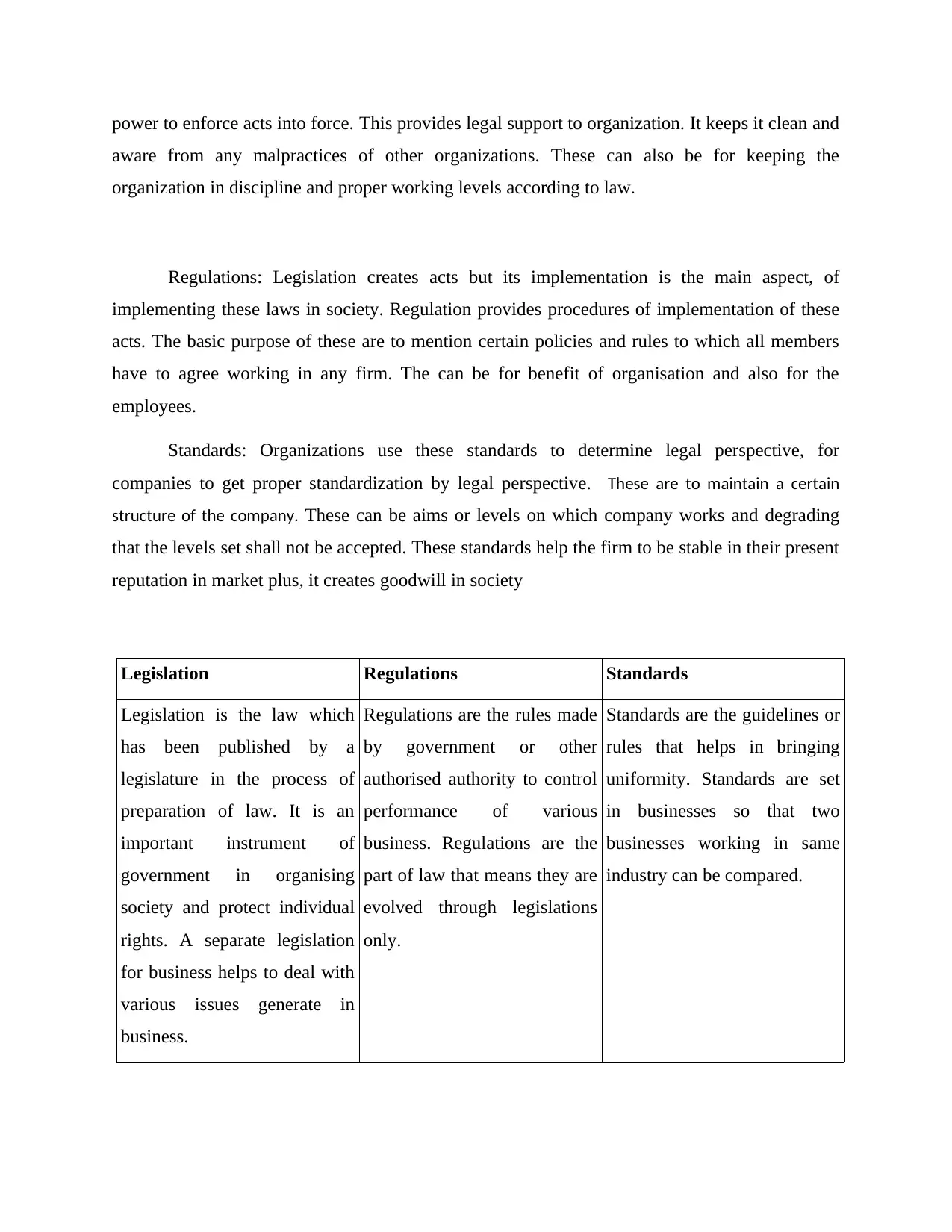
power to enforce acts into force. This provides legal support to organization. It keeps it clean and
aware from any malpractices of other organizations. These can also be for keeping the
organization in discipline and proper working levels according to law.
Regulations: Legislation creates acts but its implementation is the main aspect, of
implementing these laws in society. Regulation provides procedures of implementation of these
acts. The basic purpose of these are to mention certain policies and rules to which all members
have to agree working in any firm. The can be for benefit of organisation and also for the
employees.
Standards: Organizations use these standards to determine legal perspective, for
companies to get proper standardization by legal perspective. These are to maintain a certain
structure of the company. These can be aims or levels on which company works and degrading
that the levels set shall not be accepted. These standards help the firm to be stable in their present
reputation in market plus, it creates goodwill in society
Legislation Regulations Standards
Legislation is the law which
has been published by a
legislature in the process of
preparation of law. It is an
important instrument of
government in organising
society and protect individual
rights. A separate legislation
for business helps to deal with
various issues generate in
business.
Regulations are the rules made
by government or other
authorised authority to control
performance of various
business. Regulations are the
part of law that means they are
evolved through legislations
only.
Standards are the guidelines or
rules that helps in bringing
uniformity. Standards are set
in businesses so that two
businesses working in same
industry can be compared.
aware from any malpractices of other organizations. These can also be for keeping the
organization in discipline and proper working levels according to law.
Regulations: Legislation creates acts but its implementation is the main aspect, of
implementing these laws in society. Regulation provides procedures of implementation of these
acts. The basic purpose of these are to mention certain policies and rules to which all members
have to agree working in any firm. The can be for benefit of organisation and also for the
employees.
Standards: Organizations use these standards to determine legal perspective, for
companies to get proper standardization by legal perspective. These are to maintain a certain
structure of the company. These can be aims or levels on which company works and degrading
that the levels set shall not be accepted. These standards help the firm to be stable in their present
reputation in market plus, it creates goodwill in society
Legislation Regulations Standards
Legislation is the law which
has been published by a
legislature in the process of
preparation of law. It is an
important instrument of
government in organising
society and protect individual
rights. A separate legislation
for business helps to deal with
various issues generate in
business.
Regulations are the rules made
by government or other
authorised authority to control
performance of various
business. Regulations are the
part of law that means they are
evolved through legislations
only.
Standards are the guidelines or
rules that helps in bringing
uniformity. Standards are set
in businesses so that two
businesses working in same
industry can be compared.
Paraphrase This Document
Need a fresh take? Get an instant paraphrase of this document with our AI Paraphraser
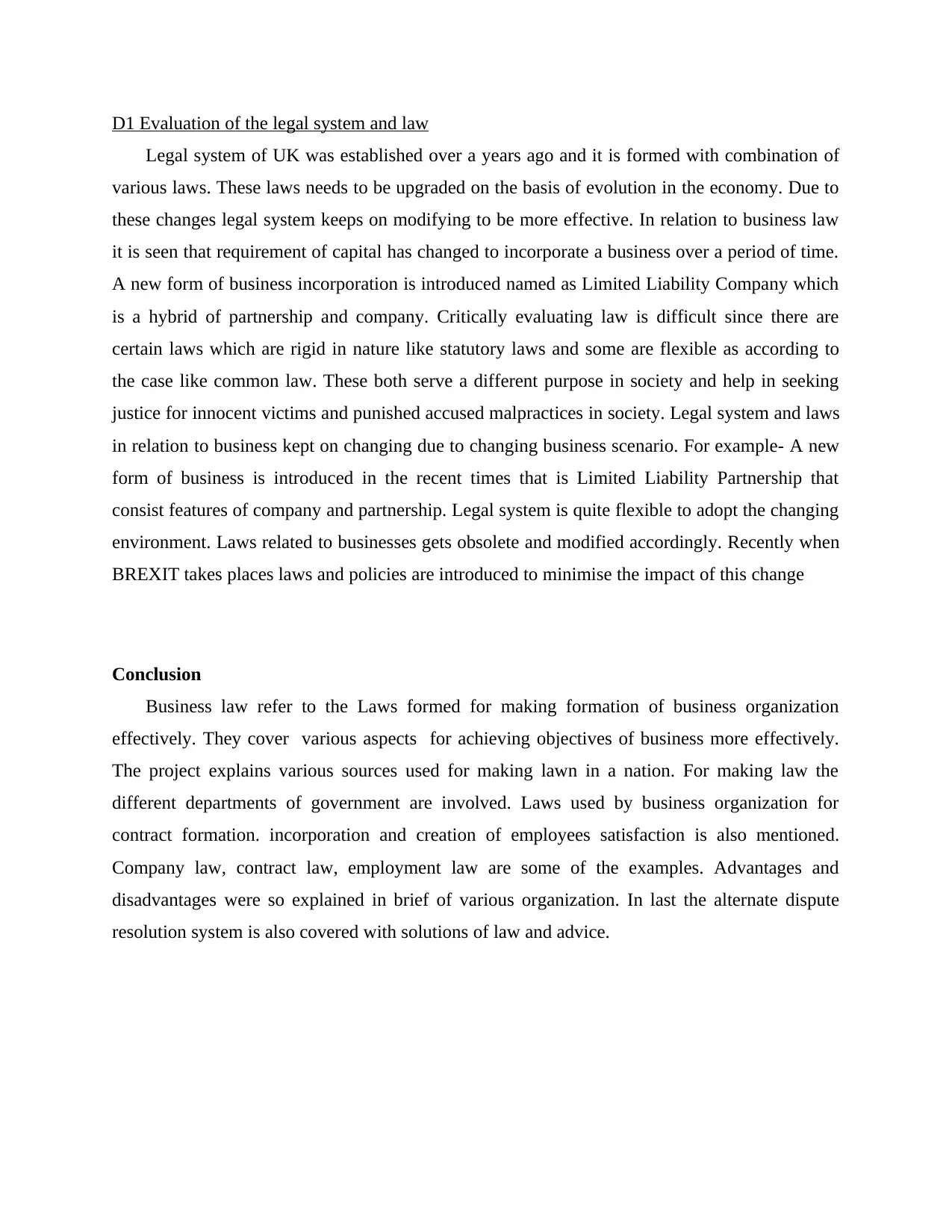
D1 Evaluation of the legal system and law
Legal system of UK was established over a years ago and it is formed with combination of
various laws. These laws needs to be upgraded on the basis of evolution in the economy. Due to
these changes legal system keeps on modifying to be more effective. In relation to business law
it is seen that requirement of capital has changed to incorporate a business over a period of time.
A new form of business incorporation is introduced named as Limited Liability Company which
is a hybrid of partnership and company. Critically evaluating law is difficult since there are
certain laws which are rigid in nature like statutory laws and some are flexible as according to
the case like common law. These both serve a different purpose in society and help in seeking
justice for innocent victims and punished accused malpractices in society. Legal system and laws
in relation to business kept on changing due to changing business scenario. For example- A new
form of business is introduced in the recent times that is Limited Liability Partnership that
consist features of company and partnership. Legal system is quite flexible to adopt the changing
environment. Laws related to businesses gets obsolete and modified accordingly. Recently when
BREXIT takes places laws and policies are introduced to minimise the impact of this change
Conclusion
Business law refer to the Laws formed for making formation of business organization
effectively. They cover various aspects for achieving objectives of business more effectively.
The project explains various sources used for making lawn in a nation. For making law the
different departments of government are involved. Laws used by business organization for
contract formation. incorporation and creation of employees satisfaction is also mentioned.
Company law, contract law, employment law are some of the examples. Advantages and
disadvantages were so explained in brief of various organization. In last the alternate dispute
resolution system is also covered with solutions of law and advice.
Legal system of UK was established over a years ago and it is formed with combination of
various laws. These laws needs to be upgraded on the basis of evolution in the economy. Due to
these changes legal system keeps on modifying to be more effective. In relation to business law
it is seen that requirement of capital has changed to incorporate a business over a period of time.
A new form of business incorporation is introduced named as Limited Liability Company which
is a hybrid of partnership and company. Critically evaluating law is difficult since there are
certain laws which are rigid in nature like statutory laws and some are flexible as according to
the case like common law. These both serve a different purpose in society and help in seeking
justice for innocent victims and punished accused malpractices in society. Legal system and laws
in relation to business kept on changing due to changing business scenario. For example- A new
form of business is introduced in the recent times that is Limited Liability Partnership that
consist features of company and partnership. Legal system is quite flexible to adopt the changing
environment. Laws related to businesses gets obsolete and modified accordingly. Recently when
BREXIT takes places laws and policies are introduced to minimise the impact of this change
Conclusion
Business law refer to the Laws formed for making formation of business organization
effectively. They cover various aspects for achieving objectives of business more effectively.
The project explains various sources used for making lawn in a nation. For making law the
different departments of government are involved. Laws used by business organization for
contract formation. incorporation and creation of employees satisfaction is also mentioned.
Company law, contract law, employment law are some of the examples. Advantages and
disadvantages were so explained in brief of various organization. In last the alternate dispute
resolution system is also covered with solutions of law and advice.
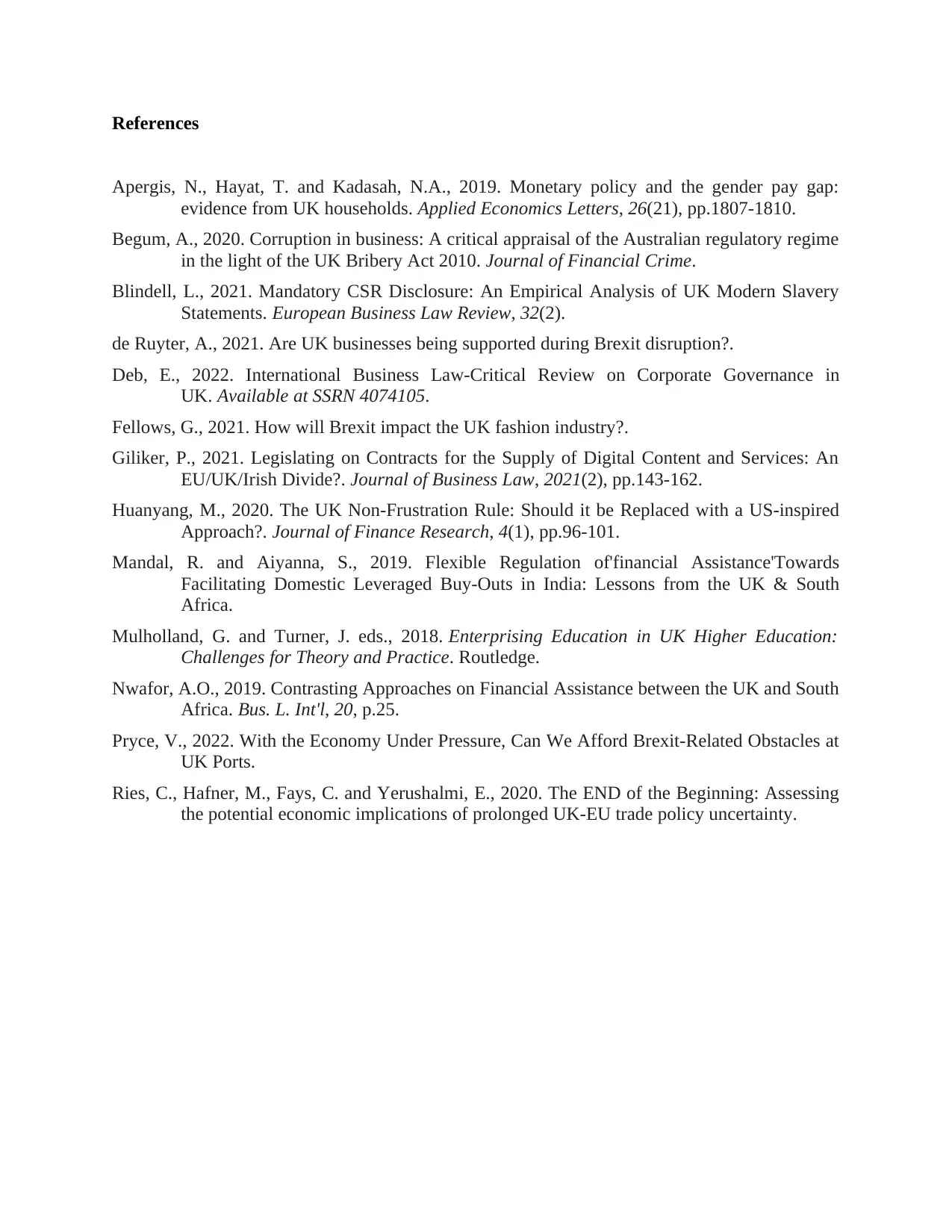
References
Apergis, N., Hayat, T. and Kadasah, N.A., 2019. Monetary policy and the gender pay gap:
evidence from UK households. Applied Economics Letters, 26(21), pp.1807-1810.
Begum, A., 2020. Corruption in business: A critical appraisal of the Australian regulatory regime
in the light of the UK Bribery Act 2010. Journal of Financial Crime.
Blindell, L., 2021. Mandatory CSR Disclosure: An Empirical Analysis of UK Modern Slavery
Statements. European Business Law Review, 32(2).
de Ruyter, A., 2021. Are UK businesses being supported during Brexit disruption?.
Deb, E., 2022. International Business Law-Critical Review on Corporate Governance in
UK. Available at SSRN 4074105.
Fellows, G., 2021. How will Brexit impact the UK fashion industry?.
Giliker, P., 2021. Legislating on Contracts for the Supply of Digital Content and Services: An
EU/UK/Irish Divide?. Journal of Business Law, 2021(2), pp.143-162.
Huanyang, M., 2020. The UK Non-Frustration Rule: Should it be Replaced with a US-inspired
Approach?. Journal of Finance Research, 4(1), pp.96-101.
Mandal, R. and Aiyanna, S., 2019. Flexible Regulation of'financial Assistance'Towards
Facilitating Domestic Leveraged Buy-Outs in India: Lessons from the UK & South
Africa.
Mulholland, G. and Turner, J. eds., 2018. Enterprising Education in UK Higher Education:
Challenges for Theory and Practice. Routledge.
Nwafor, A.O., 2019. Contrasting Approaches on Financial Assistance between the UK and South
Africa. Bus. L. Int'l, 20, p.25.
Pryce, V., 2022. With the Economy Under Pressure, Can We Afford Brexit-Related Obstacles at
UK Ports.
Ries, C., Hafner, M., Fays, C. and Yerushalmi, E., 2020. The END of the Beginning: Assessing
the potential economic implications of prolonged UK-EU trade policy uncertainty.
Apergis, N., Hayat, T. and Kadasah, N.A., 2019. Monetary policy and the gender pay gap:
evidence from UK households. Applied Economics Letters, 26(21), pp.1807-1810.
Begum, A., 2020. Corruption in business: A critical appraisal of the Australian regulatory regime
in the light of the UK Bribery Act 2010. Journal of Financial Crime.
Blindell, L., 2021. Mandatory CSR Disclosure: An Empirical Analysis of UK Modern Slavery
Statements. European Business Law Review, 32(2).
de Ruyter, A., 2021. Are UK businesses being supported during Brexit disruption?.
Deb, E., 2022. International Business Law-Critical Review on Corporate Governance in
UK. Available at SSRN 4074105.
Fellows, G., 2021. How will Brexit impact the UK fashion industry?.
Giliker, P., 2021. Legislating on Contracts for the Supply of Digital Content and Services: An
EU/UK/Irish Divide?. Journal of Business Law, 2021(2), pp.143-162.
Huanyang, M., 2020. The UK Non-Frustration Rule: Should it be Replaced with a US-inspired
Approach?. Journal of Finance Research, 4(1), pp.96-101.
Mandal, R. and Aiyanna, S., 2019. Flexible Regulation of'financial Assistance'Towards
Facilitating Domestic Leveraged Buy-Outs in India: Lessons from the UK & South
Africa.
Mulholland, G. and Turner, J. eds., 2018. Enterprising Education in UK Higher Education:
Challenges for Theory and Practice. Routledge.
Nwafor, A.O., 2019. Contrasting Approaches on Financial Assistance between the UK and South
Africa. Bus. L. Int'l, 20, p.25.
Pryce, V., 2022. With the Economy Under Pressure, Can We Afford Brexit-Related Obstacles at
UK Ports.
Ries, C., Hafner, M., Fays, C. and Yerushalmi, E., 2020. The END of the Beginning: Assessing
the potential economic implications of prolonged UK-EU trade policy uncertainty.
1 out of 9
Related Documents
Your All-in-One AI-Powered Toolkit for Academic Success.
+13062052269
info@desklib.com
Available 24*7 on WhatsApp / Email
![[object Object]](/_next/static/media/star-bottom.7253800d.svg)
Unlock your academic potential
© 2024 | Zucol Services PVT LTD | All rights reserved.



